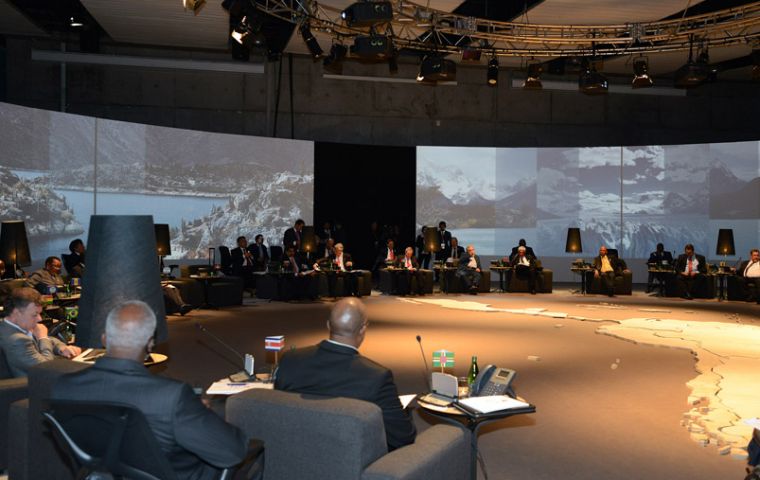MercoPress. South Atlantic News Agency
Santiago Declaration with no explicit reference to the Falklands’ dispute
 Leaders and representatives from EU and CELAC during the summit
Leaders and representatives from EU and CELAC during the summit The final document of the EU/CELAC summit in Chile which gathered representatives from 61 countries made a strong commitment to promote trade and investment between the two blocks as well as combat protectionism, but there was no explicit mention to the Falklands’ dispute with Argentina.
EU and CELAC leaders approved the document in which they reaffirm their support to resolving “controversies through peaceful means”, as enshrined in the UN charter.
Point 5 of the Santiago declaration states that “we reaffirm our commitment with all the purposes and principles established in the UN Charter.
We reaffirm our decision to support all those efforts to defend the sovereign equality of all States, respect its territorial integrity and political independence”.
The final statement differs from that presented by CELAC members who openly support Argentine claims over the Falklands and called “to overcome the existence of colonialist practices in the continent” which affect Argentina.
They also expressed “concern with the growing militarization and introduction of nuclear weapons to the South Atlantic”.
However none of this was collected in the Santiago Declaration.
But Santiago summit leaders pledged “to abstain in their international relations, from threats or the use of force in any form incompatible with the purposes and principles of the UN, to support resolutions on controversies through peaceful means and in conformity with the principles of Justice and International Law”.
In another chapter the declaration underlines the importance of the 61 countries (33 from Latam and the Caribbean and 28 from EU) to work together to promote investments in the framework of sustainable development.
Besides the declaration a plan of action for 2013/2015 was approved in a 14 page document with 48 points.
“We reaffirm our commitment to adopt policies that promote trade and investments between CELAC and EU countries, convinced that this will contribute to guarantee sustainable development and the creation of jobs, particularly juvenile employment in both regions”.
These policies must be based in “cooperation and complementarity, solidarity and social inclusion with environment responsibility”.
Furthermore the declaration makes explicit mention to avoid protectionism in all its forms.
There was also reference to making “a priority social development, health, education and the promotion of sustained and inclusive economic growth, ensuring an inclusive, fair and equal society since these are essential to achieve sustainable development”.
Other articles mention protection of the most vulnerable groups including indigenous peoples and their communities, promoting higher education, corporate know-how, scientific research and innovation, and strengthening dialogue on joint efforts referred to migration both ways.
.




Top Comments
Disclaimer & comment rules-

-

-

Read all commentsArgentina won't be happy with the “resolving differences through peaceful means in line with the UN charter.” part.
Jan 28th, 2013 - 06:06 am 0Could we be seeing a subtle shift in policy towards the Falkland Islanders and away from Argentina, especially with the referendum on the horizon?
Argentina, has of course, isolated herself with her insane protectionist policies which her neighbours have finally had enough of.
As always with CFK it's always a case of too little too late.
This is what happens when the mad cow goes home early....
Jan 28th, 2013 - 06:15 am 0'Has she gone yet?' 'yep' - mutterings of 'thank fuck for that' from the back of the room - 'OK put that crap she brought with her through the shredder and print a few more copies of this one'
The treaty of Lisbon states that the Falklands are a recognised overseas British territory, signed be all EU members, making a statement against this fact would cause just a little bit of paperwork.
Jan 28th, 2013 - 06:35 am 0Commenting for this story is now closed.
If you have a Facebook account, become a fan and comment on our Facebook Page!